“I write to preserve memories, honor my heritage, and inspire intentional introspection.”
nashi: Illustrative Poetry on Japanese Americans
In 2021, Tomosumi and his wife, Una discussed how to educate and cultivate a more compassionate community in response to rising xenophobia and anti-Asian hate.
Their conversation planted the seeds of this poetry anthology detailing
the struggles, survival, solidarity, and reparations against racism
that his Nikkei (Japanese emigrants & their descendants) o’hana
experienced during and post WWII.
See what people are saying about nashi
-
Producer of American Pastime, Outsourced, Arlington Road
“nashi is a revelation. Tomosumi's subtle, elegant haiku, punctuated by interstitial musings and nuanced illustrations by Una - both entice and provoke an examination of the hidden, dark chapter in the country's not-so-distant past in a completely new way.”
-
Retired educator and former Nisei Veterans Committee Foundation (NVCF) President
“It is inspiring to see a Gosei so passionate about carrying on the history of the past. Tomosumi uses his creative talent to combine the Japanese art of haiku with reflective and relevant questioning to encourage his readers to think about the social injustices of today. The visual enhancements bring the words to life. Through nashi, he remembers and honors the legacy of his grandparents and their WWII experiences.”
-
Poet, Community Organizer, Lawyer
“Tomosumi asks the questions America wishes to forget, including the paramount questions: 'What is the worth of having a name?' To ask is to remember who this country believes is human and who it believes can be discarded. In nashi, the collection's haiku-form brings to the life the shortness and abrupt change Japanese Americans experienced overnight after the bombing of Pearl Harbor - sudden, overt discrimination showing our families and communities 'how a pear is a pear'. Tomosumi is precise in recalling images of our collective memory from sand-covered barracks and mess halls to Minidoka pilgrimages and Bon Odori. As a reader, it is up to us to engage with these questions, images, and illustrations that Tomosumi so thoughtfully lays out to remember what the US wants us to forget. In this way, nashi illuminates history and is necessary for finding the light ahead.”



